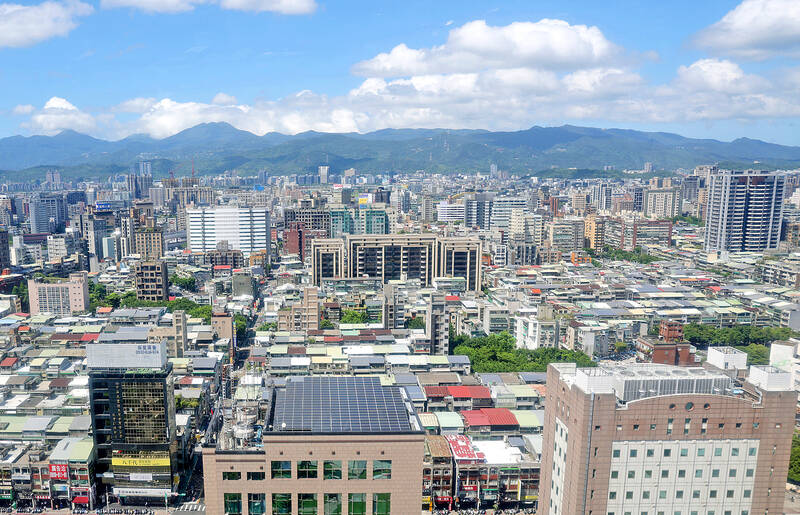The central bank on Wednesday unveiled amnesty measures to spare real estate inheritors, people with relocation needs and back deals from the credit controls it introduced on Sept. 18.
The move came less than a month after the monetary policymaker significantly tightened lending terms to avoid an overconcentration of house loans and a housing bubble.
Central bank Governor Yang Chin-long (楊金龍) had promised lawmakers to make exceptions for innocent home buyers after many protested that the latest credit control measures would deny them necessary funding, especially for presale and new houses that are soon to be delivered.

Photo: CNA
People who need to move because of a job or family-size changes also would have faced a cash crunch if they had put down a down payment equivalent to 50 percent of the house value.
Alan Pan (潘榮耀), director general of the central bank’s banking department, told a media briefing that first-time mortgage applicants could qualify for grace periods and house loans of up to 85 percent, even if they had already inherited real estate.
“The main difference is the access to grace periods for this group,” Pan said.
The central bank previously denied this group grace periods even though some only had partial ownership of real estate as a result of inheritance.
Pan said people with relocation needs could qualify for lending terms as first-home buyers if they sign an affidavit stating they would sell their old house within a year. Violators would have their favorable lending terms rescinded and need to return the difference in interest payments and pay a higher down payment, he said.
The loan-to-value ratio is 50 percent for second mortgages, 40 percent for third mortgages and 30 percent for fourth mortgages and luxury houses.
In addition, the central bank moved to spare people who had signed purchase agreements prior to the introduction of the credit controls to prevent panic sell-offs, Pan said.
Buyers of presale house projects could also opt to terminate the purchase agreements even though existing rules ban their transfer, he said.
House brokers have had mixed reactions to the exclusionary measures, but are on the same page that they want to reverse a slowdown in the housing market.
H&B Realty Co (住商不動產) said the one-year requirement is too harsh for people with relocation needs because people spend more time finding buyers, while Evertrust Rehouse Co (永慶房屋) welcomed the exemption on back deals, but predicted that a slowdown ahead remains inevitable due to strict lending terms.

The US dollar was trading at NT$29.7 at 10am today on the Taipei Foreign Exchange, as the New Taiwan dollar gained NT$1.364 from the previous close last week. The NT dollar continued to rise today, after surging 3.07 percent on Friday. After opening at NT$30.91, the NT dollar gained more than NT$1 in just 15 minutes, briefly passing the NT$30 mark. Before the US Department of the Treasury's semi-annual currency report came out, expectations that the NT dollar would keep rising were already building. The NT dollar on Friday closed at NT$31.064, up by NT$0.953 — a 3.07 percent single-day gain. Today,

‘SHORT TERM’: The local currency would likely remain strong in the near term, driven by anticipated US trade pressure, capital inflows and expectations of a US Fed rate cut The US dollar is expected to fall below NT$30 in the near term, as traders anticipate increased pressure from Washington for Taiwan to allow the New Taiwan dollar to appreciate, Cathay United Bank (國泰世華銀行) chief economist Lin Chi-chao (林啟超) said. Following a sharp drop in the greenback against the NT dollar on Friday, Lin told the Central News Agency that the local currency is likely to remain strong in the short term, driven in part by market psychology surrounding anticipated US policy pressure. On Friday, the US dollar fell NT$0.953, or 3.07 percent, closing at NT$31.064 — its lowest level since Jan.

The New Taiwan dollar and Taiwanese stocks surged on signs that trade tensions between the world’s top two economies might start easing and as US tech earnings boosted the outlook of the nation’s semiconductor exports. The NT dollar strengthened as much as 3.8 percent versus the US dollar to 30.815, the biggest intraday gain since January 2011, closing at NT$31.064. The benchmark TAIEX jumped 2.73 percent to outperform the region’s equity gauges. Outlook for global trade improved after China said it is assessing possible trade talks with the US, providing a boost for the nation’s currency and shares. As the NT dollar

The Financial Supervisory Commission (FSC) yesterday met with some of the nation’s largest insurance companies as a skyrocketing New Taiwan dollar piles pressure on their hundreds of billions of dollars in US bond investments. The commission has asked some life insurance firms, among the biggest Asian holders of US debt, to discuss how the rapidly strengthening NT dollar has impacted their operations, people familiar with the matter said. The meeting took place as the NT dollar jumped as much as 5 percent yesterday, its biggest intraday gain in more than three decades. The local currency surged as exporters rushed to